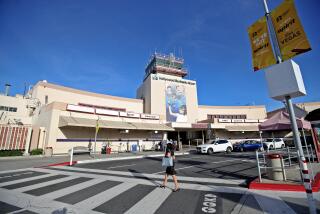The One Who Pays When Airline Loses the Bags
- Share via
PARIS — In 18 years as a foreign correspondent, traveling throughout the world, I had never permanently lost a piece of baggage on an airline flight until I traveled from Madrid to Lisbon in May. I was not too upset, naively assuming that airlines make an effort, perhaps after some red tape, to reimburse you for your loss--but I had not taken into account the small print on the back of an airline ticket.
I had checked two pieces of baggage in Madrid for a TAP (Air Portugal) flight, but received only one back when the plane landed in Lisbon. The TAP personnel were very polite and efficient in dealing with my problem at the airport, but they surprised me by going through the seemingly pointless trouble of weighing the suitcase that had arrived.
After a few days, when my bag did not show up, TAP asked me to list the items lost and their value. In what I regard as a rather conservative estimate, I came up with a total of $339, counting a leather toilet case, toiletries, a computer cable, medicines, batteries, shirts, other clothing, and the canvas bag itself. I was told that if the bag did not show up in a month, the TAP office in Paris, where I live, would take care of the claim.
Nothing Yields Nothing
A month later, Ondina Carvalheiro, who handles claims at the TAP office in Paris, notified me that there was a problem. Under international rules, she said, airlines do not base their reimbursement on the value of the lost baggage but on its weight. TAP was liable, under these rules, to pay me $20 for every kilogram (or $9.07 for every pound) of baggage lost.
According to her records, she said, my bag had weighed nothing and TAP therefore legally owed me nothing. Her logic, according to her rules, was easy to follow:
The clerk at the check-in counter in Madrid had noted on my ticket that my bags weighed a total of 20 kilograms (44 pounds), the limit allowed. Outside the United States, airlines still put a weight limit on checked baggage. To avoid a hassle over charging for excess baggage, clerks often mark baggage on European flights as weighing no more than 20 kilograms, no matter what the true weight.
Because TAP’s records showed that the suitcase that did arrive in Lisbon had weighed 20 kilograms, Carvalheiro said, simple arithmetic showed that the missing suitcase had weighed nothing: The total weight of the two bags (20 kilograms) minus the weight of the returned bag (20 kilograms) equalled the weight of the missing bag (zero). I had therefore lost nothing.
The ‘Final Offer’
She, of course, recognized the absurdity of this and said that TAP would probably set the weight of my lost bag at one or two kilograms, paying me somewhere between $20 and $40. When I refused that, she came through a few weeks later with “a final offer,” which she described as “a commercial gesture.” TAP would accept 4 1/2 kilograms as the weight of the suitcase and pay me $90. When I protested, she expressed surprise, saying, “We do not really owe anything.”
In the end, TAP upped the weight of my lost baggage to 5 1/2 kilograms and sent me a check for the equivalent in French francs of $110. It seemed pointless to argue any more.
Carvalheiro, according to the small print on the back of airline tickets, was technically correct. U.S. federal regulations require airlines on flights within the United States to have a liability of “at least $1,250 a passenger.” But the small print states that on all international flights an airline’s maximum liability for lost baggage is only $20 a kilogram.
This works in a complex way. There are all kinds of variations. Airlines set different limits on the amount of weight they will insure. The rules are different for planes that begin or end their flights in the United States. The U.S. government interprets regulations differently from European governments. It is very difficult for a passenger, even after reading the small print, to know the maximum amount of reimbursement for a lost bag.
Taking Out Insurance
But in many cases the maximum is likely to be smaller than a passenger believes the baggage is worth. A passenger can get around this by taking out insurance at a small cost. But few know about this.
“If your eyes are good enough,” said John Brindley, a spokesman for the International Air Transport Assn. (IATA) in Geneva, “it’s clearly stated on the ticket that if you have something of excess value, like a Stradivarius or your wife’s collection of jewels, you should declare it and insure it. But nobody thinks to look at the ticket.”
The whole airline industry seems rather defensive about this problem of lost baggage. A series of phone calls showed a good deal of confusion, resentment, suspicion and reluctance to talk about the subject. There is little doubt that airlines have dealt with a lot of passengers unhappy with their settlements over the years.
The official who handles claims for the Paris office of Iberia Airways, for example, refused to identify himself by name. “I am not going to be made a scapegoat,” he said.
In New York, James Arey, the director of public relations for Pan American, defended the international regulations. “You have to understand that your baggage is supposed to contain only items for personal use,” he said. “You are not supposed to check in a refrigerator or a television set.”
The image shocked me because the weight of a refrigerator did not seem to have any bearing on the way I was being undercompensated by TAP. But Arey’s hyperbole was obviously based on the more generous rules that apply to baggage liability for travel to and from the United States.
Except British Airways
Almost all airline officials insisted that they follow the international regulations closely. Only British Airways tried to emphasize that it stretched the rules as much as it could to satisfy passengers. Maite Bianchi, who handles claims for the British Airways office in Paris, said, “If we took only the weight into consideration, we would never reimburse anything.”
In a phone call from Washington, Dean Witt, a transportation industry analyst for the Consumer Affairs Division of the U.S. Department of Transportation, tried to explain the complex rules and practices to me:
1--Passengers flying from the United States to other countries and back are allowed to check two pieces of baggage of any weight. How do you figure out the maximum liability? Witt said the airline can state in advance a figure that it will automatically accept as the weight of a bag. This is known as “predetermined weight.”
TWA says its maximum liability on international flights to and from the United States is $560 a bag. Pan Am says its maximum liability on international flights to and from the United States is $640 a bag. These liabilities are stated on Pan Am and TWA tickets.
Witt explained that this means that Pan Am was setting a “predetermined weight” of 32 kilograms a bag (32 kilograms multipled by $20 equals $640) and TWA a “predetermined weight” of 28 kilograms a bag (28 kilograms multiplied by $20 equals $560).
When an airline does not announce a predetermined weight, Witt said, it should weigh the bags (even though there is no limit on weight) and mark that on the ticket. The maximum liability is $20 per kilogram, according to Witt, no matter how heavy the bag.
But even this gets complicated. Air France and British Airways, for example, announce no “predetermined weight” on tickets but insist, when asked, that maximum liability is $640 a bag.
2--The Department of Transportation, according to Witt, does not accept the system used by TAP for figuring out my loss--subtracting the weight of the returned bag from the total weight to get a figure for liability. That is known as “prorating.” According to the American interpretation of the rules, TAP could have paid me as much as $400 (its total liability for both bags) even though one of my two bags did show up.
The Hague Protocol
But Witt said that TAP’s practice is allowed by an international treaty called the Hague Protocol that the U.S. government has never signed.
3--The DOT insists that an airplane that begins or ends its flight in the United States must allow a passenger who boards the plane in a foreign city to check two bags of any weight. As a practical matter, however, this is difficult to do, as the rules of most foreign countries require airlines to check no more than 20 kilograms (44 pounds) of baggage for an economy passenger, 30 kilograms (66 pounds) for first-class.
The Consumer Affairs Division of DOT will consider complaints by passengers who are not satisfied with their compensation for lost baggage. If the division takes up a case and is unable to persuade the airline to increase compensation, the passenger can file suit in small claims court if the airline does any business in the passenger’s state.
But in my case, DOT could do nothing because my TAP flight did not originate or end in the United States.
Where do these unsatisfactory (for the passenger) international regulations come from?
Rules Vintage 1929
In another phone call, Michel Pourcelet, the senior legal official of the U.N. International Civil Aviation Organization in Montreal, told me that the rules on baggage liability were set down in the 1929 Warsaw Convention, a treaty signed by more than 140 governments. In those days of deflated prices and little air travel, the convention set a maximum liability equal to $20 in 1985 currency for every kilogram of baggage lost.
What is a passenger to do? Now that I, having lost a bag, am a more experienced traveler, I plan to follow a few rules of thumb:
Avoid airlines such as TAP with a proved record of dissatisfaction, lean toward American airlines on those limited routes where they fly between foreign cities, pack my cheapest clothes for trips, carry all valuable items aboard the plane, watch closely the amount of weight that a check-in clerk sets down on my ticket, and take out insurance when forced to check a bag with items worth a good deal of money.
(Researcher Alice Sedar of The Times’ Paris bureau contributed to this article.)
More to Read
Sign up for The Wild
We’ll help you find the best places to hike, bike and run, as well as the perfect silent spots for meditation and yoga.
You may occasionally receive promotional content from the Los Angeles Times.






